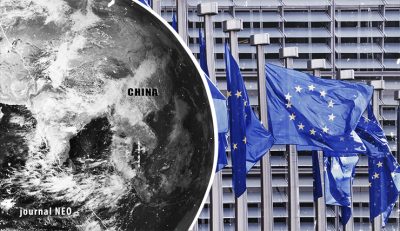The China-Pakistan Economic Corridor (CPEC). Why is the European Union Opposed to It?

The European Foundation for South Asian Studies (EFSAS) put together a day-long seminar chastising the China–Pakistan Economic Corridor (CPEC). Organised by Jonathan Bullock, a UK Independence Party (UKIP) Member of the European Parliament (MEP), it gathered European critics of China’s rise upon the global stage along with US and European-funded agitators active in undermining Chinese-Pakistani relations.
The CPEC is a keystone project amid Chinese-Pakistani ties and an integral part of Beijing’s One Belt, One Road initiative (OBOR). It includes energy and transportation projects developing and connecting Pakistan’s Baluchistan province along the Arabian Sea with Chinese territory along Pakistan and China’s border.
When completed, the projects will increase both Pakistan’s prospects and China’s influence not only in Pakistan, but across the wider region. Together with other OBOR projects, CPEC will be yet another step toward the rise of Eurasia out from under centuries of European domination.
For MEP Jonathan Bullock of UKIP, it is somewhat perplexing to see a politician supposedly concerned with British independence so eager to interfere in the sovereignty of Pakistan and China, thousands of kilometers from British or indeed, all of Europe’s shores.
The EFSAS website included a summary of the CPEC-oriented event:
A high level panel consisting of Members European Parliament (MEPs), Scholars and Academicians spoke at the event and discussed the construction of the China Pakistan Economic Corridor (CPEC) and its interrelated legal, geo-strategic, economic and environmental issues, which directly impact the stability of South Asia.
Participants claimed that China would assume unwarranted influence over Pakistan over the course of the projects’ construction. Concerns related to Pakistan’s Kashmir region and Baluchistan were also brought up by representatives of separatist groups, many of which are funded by the US and Europe specifically to serve as vectors for Western influence in Pakistan and agents of destabilisation not only within Pakistan, but between Pakistan and its immediate neighbours (Afghanistan, India, Iran and China).
The EFSAS’ statement would claim:
Mr. Fernando Burgés, Programme Manager at the Unrepresented Nations and Peoples Organization (UNPO), provided his perspective on the negative repercussion stemming from the construction of the CPEC, which goes through the disputed territory of Gilgit Baltistan, part of the erstwhile Princely State of Jammu & Kashmir over which Pakistan does not have any legal right.
The UNPO serves as collective representation for myriad separatist groups backed by Western special interests used to agitate around the globe.
They have included or currently include Chechen separatists seeking to carve off territory from Russia’s south, Tibetan separatists backed for decades by the US Central Intelligence Agency (CIA) and various groups from Kashmir and Baluchistan. The latter are backed by the US State Department in their bid for independence and the effective end of Chinese access to the Arabian Sea via the recently built Gwadar Port.
It should be noted that Pakistan’s claimed portion of the Kashmir region is its only direct access to the Chinese border in the north. Thus it is especially convenient that here, the UNPO has found yet another group to support which seeks independence and would effectively close Pakistan off from China in the north.
While the European Union’s various MEPs complaining about the CPEC will hardly do anything to slow down its construction let alone stop it, even augmented with US and European funded and backed separatist groups attempting to complicate security on the ground, it is important to understand the persistent imperial chauvinism that still deeply infects many circles of political elite across the West.
It is also important to understand how it manifests itself politically through various but entirely disingenuous and cynically abused “human rights” causes. Likewise, it is important to see how it manifests itself on the ground where these interests seek to disrupt their geopolitical competitors instead of finding common grounds for cooperation and mutual benefit.
Alternative circles of interests both in the US and Europe and elsewhere around the globe will seek common grounds for cooperation and mutual benefit with China and its many Eurasian partners. They will ultimately find themselves in prime seats at the table of emerging multipolarism while the instigators and imperial chauvinists find themselves out in the cold.
*
Note to readers: please click the share buttons above. Forward this article to your email lists. Crosspost on your blog site, internet forums. etc.
Joseph Thomas is chief editor of Thailand-based geopolitical journal, The New Atlas and contributor to the online magazine “New Eastern Outlook”.
Featured image is from NEO

